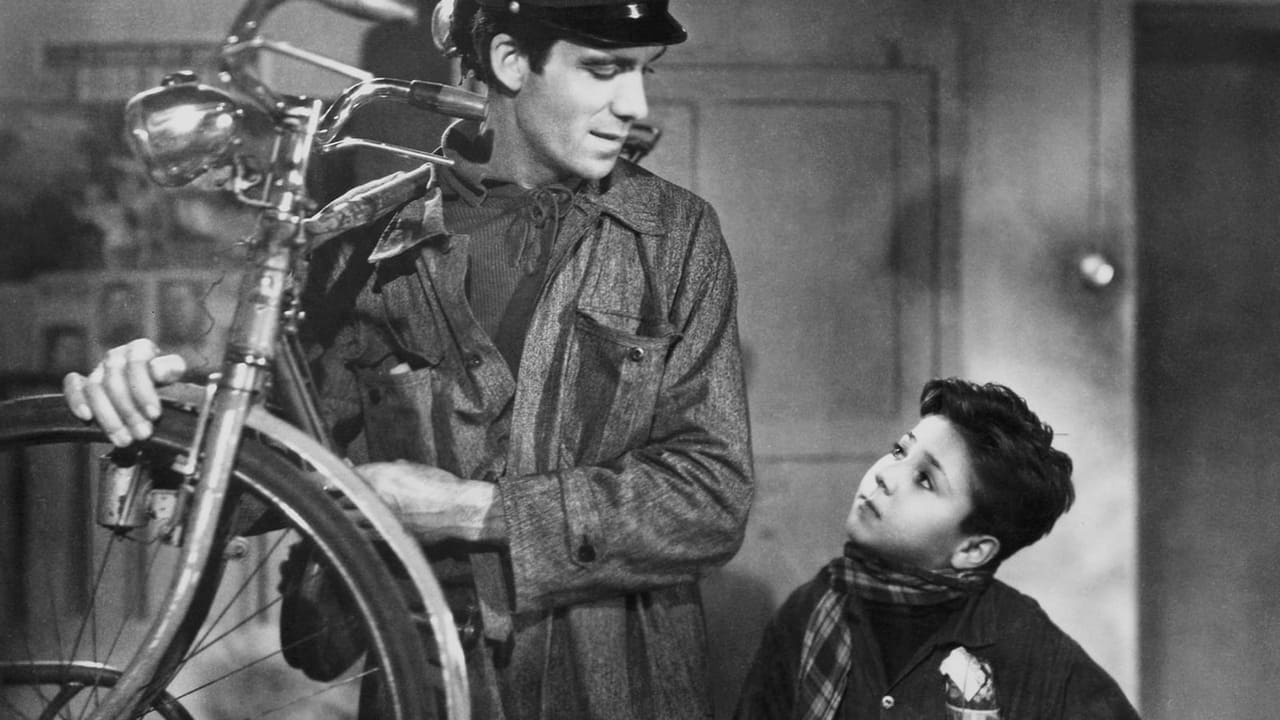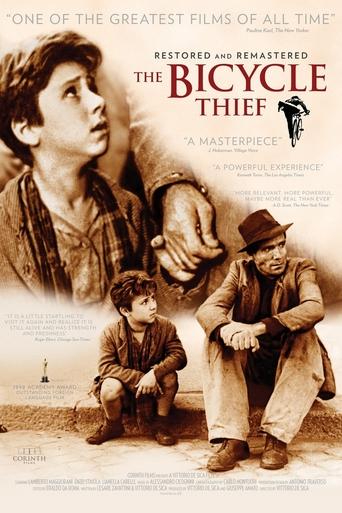

Saw this when i was a kid. Revisited it recently on a blu ray. In post-war Rome, Antonio (Lamberto Maggiorani) is offered a job of putting posters up in the city but that job requires a bicycle. Antonio hails from a poverty stricken class n he cannot afford to miss this job as unemployment is very high. Trouble is he had already pawned the bicycle to put food on the table for his family. His resourceful wife sells the bed linens in order to get the money to get his bicycle back. One of the most touching scene is when Antonio and his small son Bruno goes to work carrying their egg sandwiches. Antonio drops the kid at the gas station n so its implied that the kid works there, while he goes in the city to paste the posters n on the very first day his bicycle is robbed by a thief who manages to get away. Director Vittorio De Sica captured the working class lifestyle to perfection by avoiding professional actors and going for real, everyday people n real locations with the everyday hustle and bustle. The film succeeded in capturing the grim realities of regular working people and the everyday struggle. Lamberto Maggiorani being a non professional actor did a terrific job. We as audience empathize with him n his struggles n in the final act in spite of him doing a wrong thing, we want him to succeed. Another noteworthy thing is the small kid. The hotel lunch scene was also very touching. The dialogues before the lunch scene, lets go down in style & everything has a cure except death by Antonio to his son is really encouraging. This film is relevant today due to people living in ghettos.
... View MoreTo be completely honest I came to this film as just another movie to cross off the list that everyone talked about. It was almost a joke. If you wanted to get into foreign films it was this and The 400 Blows, and maybe Seven Samurai. And I watched this film with the expectations that it was a CLASSIC, or Untouchable or a film without a peer, after all in Robert Altman's "The Player", the thought of remaking this film is a joke, and as a character says "You'd probably give it a happy ending." So I came into it expecting a depressing, black-and-white-foreign-language film that was completely removed from me and unrelatable in the sense that I would never know what it felt like to be a father in post-war Italy. I was wrong. In plain and simple terms I couldn't have been more wrong. This film, apart from being engaging and full of pathos and tragedy, represented so many disturbing and uplifting facets of the world that for every fear there was angel, for every danger was a comfort. This should always and forever be remembered as the Greatest Street Casting of all time and it should also be remembered as the Greatest Father-Son-Film of all time. Whether you have a wonderful relationship or a strained relationship with your father this film could go a long way to explaining a lot of the simplicities and complexities of relationships that have haunted humans for generations. This is a pure film. It's honest. It's real and it's magnificent. It will stand the test of time, and it unfortunately has never been topped. I can't give you historical reasons or even reasons based on the creators' filmography why this film is so magnificent, I can't even give you a non-emotional reason why this film is just so damn good, all I can say, or recommend is that this film goes deeper than you expect it to, further than you want it to, and represents a slice of life than hopefully none of us will ever know, and in that creates a beautiful piece of art that has lasted 70 years and could easily last 70 more.
... View MoreWatching Vittorio de Sata's 1948 film 'Bicycle Thieves' one is struck just quite how poor post-war Italy was: not only might ownership of a bicycle be critical to your chances of earning a livelihood, you might even pawn your bed-sheets when in need of money, while in the most deprived districts, people lived in almost medieval conditions. The film is rightly celebrated for its naturalism, although the story is essentially a shaggy-dog tale, and the primitive state of film-making 70 years ago cannot be totally ignored: the camera is just so much less proactive than on modern movies. But the heartbreaking ending, which finally explains the plural in the film's title, is perfectly judged. To an audience for which such tales really were their everyday reality, it must have been powerful stuff.
... View More'Bicycle Thieves' is a sometimes poignant film about the plight of the 'little man' who has no contacts, no influence, no money, no nothing'.I must admit that the extremely high esteem in which it is held leaves me slightly at a loss. Its themes of wealth and class are clear but they rarely evoked much emotion within me for Antonio - our protagonist and victim of the titular bicycle thieves - is rather dull. The one and only exception to this is when he gleefully indulges at a local restaurant with his son Bruno. Alas, the pleasure it brings them is fleeting.I felt a modicum of indignation here and a degree of pathos there, but ultimately, 'Bicycle Thieves' did not compel me. Certainly not compared to the gritty kitchen sink fare of the British New Wave some years later. Rather, I appreciated it as a cinematic artefact; an educational experience rather than an entertaining one.
... View More